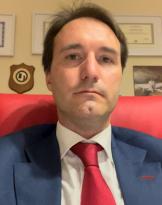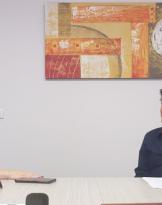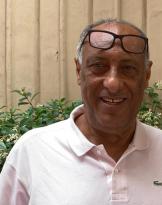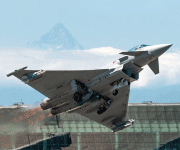The "Pozzuolo del Friuli Cavalry Brigade “ took over the "Sassari" one, to keep on leading the Leonte Operation in the UNIFIL (United Nations Interim Force in Lebanon), the UN peacekeeping force in South Lebanon. The Sector West Commander is currently Brigadier General Ugo Cillo. It’s been two months since his Brigade has been deployed in the mission, during thistime he has been meeting the main civil, military and religious authorities of the above mentioned area. The General Cillo has described to the DifesaOnline readers the key theme of the Italian recipe to its successful international peacekeeping missions: the civil and military cooperation.
General Ugo Cillo, how significant has been the progress reached in the civilian and military UNIFIL cooperation since 2006 and based on your professional experience?
My experience in Lebanon dates back to 2006, in the North of Tyre during the "Leonte I Operation" as a battalion commander of the Lagunari. At that time, the brigade of "Pozzuolo del Friuli Cavalry" commanded the West Sector, too . After 10 years, I have returned to Lebanon as commander of the "Pozzuolo", at its fifth mandate in the land of the cedars. The assistance to the civilian population brought about the civil-military cooperation (CIMIC) and the reconstruction projects are both a key part of the 1701 UN Resolution . Italy devotes to this area, using the expertise military CIMIC GROUP SOUTH, placed in Motta di Livenza. Since 2006, over 750 CIMIC projects have been implemented, including to the public infrastructure such as roads, schools and hospitals, professional courses and humanitarian aids to the disadvantaged people, as well.
What about your unit activities ?
The Cavalry Brigade took over the Sector West Command, October last year. During these months we have completed some projects our predecessors (the Sassari Brigade) previously started and we too have introduced new ones, such as the redevelopment and energy adjustment’ s one in Shama, where the sector west is placed , and installing new public lighting. In this project, carried out in other municipalities, we have used renewable energy from photovoltaic systems, which allow the public lighting where, as in Lebanon occurs, the national power grid is not always suitable.
 We then worked for the governmental hospital in Bint Jbail, completing the hospital area with some equipments the Novara Ospedale Maggiore donated to, and the school in Rmeish where new paving and the stoves have been installed. We have delivered toys to children the Rotary Club of "Rome Campidoglio" donated to. In Buj Ash Shamal, however, we have stocked the local school with new housing furniture. In the town of Bayt Yahoun, we have installed new furniture and outdoor games in the public garden, allowing citizens to benefit from that place so the children can play safely . The support to the development of female entrepreneurship has been followed in synergy with the UNIFIL Civil Affair. In this context, we have been promoting in fact the markets organization, where the handicrafts made by southern women's cooperatives are sold. The Lebanon project’s list is very long, coupled to previously mentioned, the health medical care must be added. We have been organizing free medical examinations (medical care) and mobile clinics where our military medical personnel has been deployed.
We then worked for the governmental hospital in Bint Jbail, completing the hospital area with some equipments the Novara Ospedale Maggiore donated to, and the school in Rmeish where new paving and the stoves have been installed. We have delivered toys to children the Rotary Club of "Rome Campidoglio" donated to. In Buj Ash Shamal, however, we have stocked the local school with new housing furniture. In the town of Bayt Yahoun, we have installed new furniture and outdoor games in the public garden, allowing citizens to benefit from that place so the children can play safely . The support to the development of female entrepreneurship has been followed in synergy with the UNIFIL Civil Affair. In this context, we have been promoting in fact the markets organization, where the handicrafts made by southern women's cooperatives are sold. The Lebanon project’s list is very long, coupled to previously mentioned, the health medical care must be added. We have been organizing free medical examinations (medical care) and mobile clinics where our military medical personnel has been deployed.
What about local authorities relationships ? how useful has been information sharing ?
The relations with the local authorities are always constant. During these two months ‘ time I have been meeting the highest political, military and religious authorities, to facilitate the application and UN 1701 resolution ‘s respect. I have met lately all the religious leaders of southern Lebanon: the Shiite mufti of Tyre Sheikh Hassan Abdallah, the Sunni mufti Midrar Saad Eldin Habbal, the Maronite archbishop Skukrallah Nabil Al Haje, the Catholic bishop greek Mikhael El Abrass. The exchange of information is mutual, there is a great availability and we have worked in harmony, respecting roles and responsibilities. The cooperation in the field of security and reconstruction is a common interest, consequently we have a good interaction with the local communities. A good example is the success of the "trilateral meeting" (a meeting convened by the Force Commander of UNIFIL to which representatives of the Israeli armed forces and the Lebanese armed forces met), unique comparison tool, which have joined Lebanon and Israel so far, groped to resolve sensitive issues relating to security, through the mediation of representatives of UNIFIL, the force commander first of all.
The exchange of information is mutual, there is a great availability and we have worked in harmony, respecting roles and responsibilities. The cooperation in the field of security and reconstruction is a common interest, consequently we have a good interaction with the local communities. A good example is the success of the "trilateral meeting" (a meeting convened by the Force Commander of UNIFIL to which representatives of the Israeli armed forces and the Lebanese armed forces met), unique comparison tool, which have joined Lebanon and Israel so far, groped to resolve sensitive issues relating to security, through the mediation of representatives of UNIFIL, the force commander first of all.
Have other actors, such as our country NGOs , universities or industry environment been involved in the above mentioned activities ?
Certainly yes. Many NGOs, associations, non-profit and cultural realities offered an important contribution in the implementation of civil-military cooperation initiatives. Universities too have expressed their interest in the contingent ‘s activities, Pozzuolo del Friuli Brigade has a long-standing collaboration with the University of Trieste and the University of Udine. There are ongoing collaborative projects with universities in the South of Lebanon with the second one.
What are the projects involving the population coupled with assistance to vulnerable groups and to the road infrastructure?
 In addition to the civil-military cooperation activities, the Italian contingent has been organizing some initiatives such as road and domestic safety , professional courses and Italian language one. We also organized a cooking class in Maraaka, this was attended by five other municipalities successfully, involving the women's community cooperation. In terms of safety on the road we have performed some information campaigns on safe driving and compliance with safety standards for the children transport by car. We too have organized meetings on food preservation and prevention from food poisoning, involving our veterinarians too. Other activities have involved the sport such as the Inter Campus. Based on the sport values with educational and recreational activities the Campus has taken place for many years by now, in south Lebanon.
In addition to the civil-military cooperation activities, the Italian contingent has been organizing some initiatives such as road and domestic safety , professional courses and Italian language one. We also organized a cooking class in Maraaka, this was attended by five other municipalities successfully, involving the women's community cooperation. In terms of safety on the road we have performed some information campaigns on safe driving and compliance with safety standards for the children transport by car. We too have organized meetings on food preservation and prevention from food poisoning, involving our veterinarians too. Other activities have involved the sport such as the Inter Campus. Based on the sport values with educational and recreational activities the Campus has taken place for many years by now, in south Lebanon.
If you could change the approach to the activities which sector would you increase the effort among health, education and social environment, in your opinion?
In my opinion, a balanced and coherent approach has been adopted in the management of interventions, in favor of the population. In fact, the projects are fulfilled in agreement with local authorities on the basis of their demands and they reflect a fair balance among the different needs.













